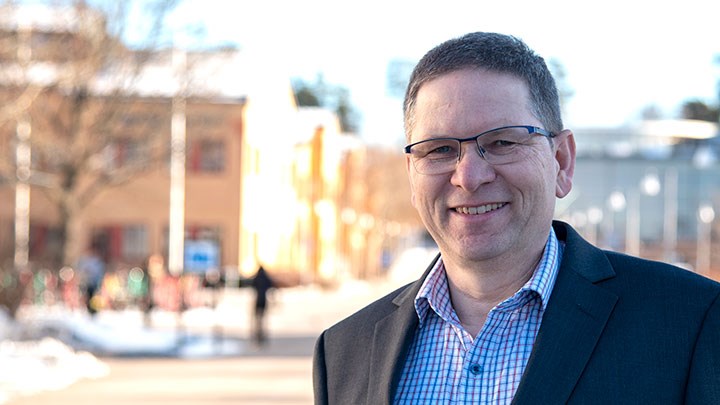Thomas Barow - new professor 2023

Thomas Barow is professor of education focusing on special education. His research looks at special education and education for persons with disabilities from both a historic and contemporary perspective.
“Developments throughout history shows tendencies towards inclusion as well as exclusion, both conflicting and parallel processes,” he says.
- 1969 Born in Hagen in Westphalia, Germany
- 2007 Obtained his PhD at Humboldt University of Berlin in special education with his thesis Die “Schwachsinnigenfürsorge“ in Schweden 1916–1945 unter besonderer Berücksichtigung pädagogischer Entwicklungen (The care of the feeble-minded in Sweden 1916–1945 with special regard to educational developments)
- 2019 Docent in Education at University of Gothenburg
- 2022 Professor of Education at Örebro University
Thomas Barow has a long experience from school and higher education from Sweden and Germany. In his doctoral thesis, he studied the care of “the feeble-minded” in Sweden between the wars and during the Second World War. He also examined which significance work and occupation were ascribed within training for persons with intellectual disabilities.
“In order to understand where we are at now and in order to predict future developments, research on special education history can be highly beneficial.”
Different views on special education
In recent years, Thomas Barow has mainly researched different views of special education in an international and comparative perspective, mainly based on the situation in Sweden and Germany. Together with his colleague Daniel Östlund, Kristianstad University, he has shown that there is awareness among teachers of the significance of the environment for learning and development. It is also true, however, that concrete support measures in practice often have a much narrower perspective.
Special education measures are often geared towards individuals, and providing stimuli at a group or organisational level is often underrated. Introducing the environment as a support factor has great potential. In addition, the pupils’ own perspective should play a bigger part, according to Thomas Barow. In a study conducted in the German state of North Rhine-Westphalia, Thomas Barow and Daniel Östlund examined the guiding principles used by case officers and decision makers in special education needs assessments and the categorisation of special education support. For this they received a research award from the German foundation Dietrich-Eggert-Stiftung für schulische Inklusion.
“It is of course very rewarding when academic work is recognised in this way. In a longer-term perspective, we are hoping for a new development also within everyday school activities,” he says.
Extensive experience from schools
Thomas Barow is more than familiar with the education setting. Before moving to Sweden in 2008, he was a special education teacher working in schools and special schools for over 10 years in Germany.
“In that time, I had gained extensive experience from schools and the education sector. That knowledge has enabled me to connect theory and practice on the teacher education programme. And that link is something that students often call for – and rightly so!”
Practice-based research is central in Thomas Barow’s current research – a project on collaboration in compulsory school for pupils with learning disabilities. This kind of practice-based research is intended to contribute to the development of different modes of collaboration between teachers and other professionals within schools for pupils with considerable disabilities.
“Regardless of all efforts that are being made to bring about inclusion we can’t overlook the fact that there is a large number of pupils who receive their instruction in adapted education settings. Those very pupils are particularly vulnerable and require the best teaching methods – and this is where research can make a difference,” says Thomas Barow.
Experience from multiple universities
Important milestones in Thomas Barow’s academic career are senior lecturer positions at the universities of Borås, Halmstad and Gothenburg, but also positions as acting professor at the universities of Siegen, Erfurt and Cologne. Central to his professional career is the desire to understand research and education as one entity, springing from the Humboldt Bildung ideal – that studies can contribute to personal development and growth.
“My German origin and in particular my doctoral studies at Humboldt University of Berlin have definitely left their mark. Research and education are two sides of the same coin, and academic freedom is crucial to the development of the university.”
